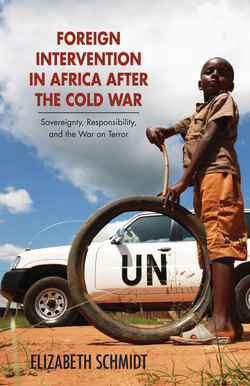Читать книгу Foreign Intervention in Africa after the Cold War - Elizabeth Schmidt - Страница 9
На сайте Литреса книга снята с продажи.
ОглавлениеAcknowledgments
This book would not have seen the light of day had it not been for the insightful critique and encouragement of William Minter, my friend, colleague, and collaborator for nearly four decades. An invaluable partner as I wrote Foreign Intervention in Africa: From the Cold War to the War on Terror (Cambridge University Press, 2013), Bill kindly agreed to serve as my developmental editor for this volume as well. Without his keen social scientist’s eye, the proverbial trees of the historical narrative would surely have overwhelmed the forest. His deep understanding of the continent and its complexities helped me produce a far better manuscript, and his grasp of recent scholarship kept me abreast of rapidly changing events.
Others to whom I owe a great debt include Allen Isaacman, Regents Professor of History at the University of Minnesota, for his diligent and perceptive reading of the entire manuscript; David Newbury, Gwendolen Carter Chair in African Studies and Professor Emeritus of History at Smith College, for his astute reading and commentary on the Rwanda chapter; and Steve Howard, professor in the School of Media Arts and Studies at Ohio University, who commented on the Sudan chapter. All of these scholars saved me from many errors and oversimplifications; those that remain are solely my own. I also thank the anonymous external readers for Ohio University Press, from whom I received much valuable advice. Finally, I am grateful to a multitude of activist academics, friends, and colleagues who have modeled the integration of scholarship and solidarity.
At Ohio University Press, Gillian Berchowitz, director and editor in chief, believed in the project’s potential and accommodated its long delay. Managing editor Nancy Basmajian and production manager Beth Pratt guided the manuscript through the production process, and Sebastian Biot tracked down the perfect cover image. I am also grateful to other staff members at the Press who applied their skills to bring the project to fruition.
Other individuals and institutions supported the project in important ways. In particular, I thank the staff of Loyola Notre Dame Library for their ever-prompt responses to my requests for materials and advice. Loyola University Maryland contributed significant financial support. The Research and Sabbatical Committee, the Center for the Humanities, the deans of the College of Arts and Sciences, and the vice president for Academic Affairs provided sabbatical funding and paid for maps, photographs, and developmental editing. Cartographer Philip Schwartzberg at Meridian Mapping produced the maps to precise specification and patiently dealt with multiple changes. Many photographers endured difficult conditions to take powerful pictures, which they kindly allowed me to use. Catherine Sunshine provided superb professional copyediting and stylistic advice.
Last but certainly not least, I thank my inestimable network of friends and family. For their love, support, and encouragement, I am grateful to my parents, Albert and Kathryn Schmidt; to my son Jann Grovogui; and to countless friends and colleagues—all of whom provided joy and perspective and tolerated the mood swings that book writing always entails.
